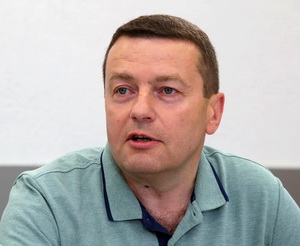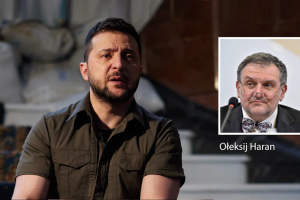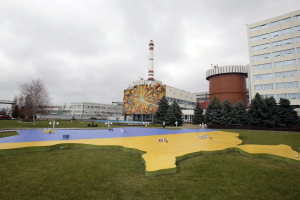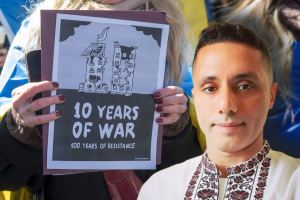
Oleksandr Reznik,
Doctor of Sociology,
Head of the Department of Social and Political Processes of the Institute of Sociology
of the National Academy of Sciences of Ukraine,
Head of the Center for Political Sociology
When a robber approaches you at night on a deserted street and demands your wallet threatening you with a weapon, you will most likely give it to the robber. The risk of losing your life outweighs financial losses. In the social sciences, the theory of rational choice is widespread. The theory tries to explain the behavior of social actors with abstract models of benefits and losses which are calculated taking into account the opportunities and constraints due to the context of the situation. This is what the aggressor is actually motivated by when he commits a series of horrific, terrorist actions in order to persuade the victim to make concessions. This was the case with the Russian invaders, who launched a full-scale attack on Ukrainians on February 24, 2022 and soon offered negotiations on surrender and territorial concessions to secure their gains.
And while the theory of rational choice can successfully explain individual behavior, group behavior, which is mediated through social interaction, cannot always be explained in this way. It happens because in case of group behavior, there is not only the aspiration to preserve individual life, but also the factors of human dignity and sense of existential threat to one's family, relatives and friends, and nation are involved. After all, the comparison of alternatives - to survive, but at the same time to be dishonored and erased as a nation, or to risk life and fight to win - depends on the consciousness of an individual or group. That is, human behavior can be modeled not only by purely selfish incentives, but also by societal motives, when individual action is correlated with the interests of the whole society.
The social determination to fight for the country depends on many factors. In particular, it depends on the situation on the battlefield, on the number of civilian casualties and military casualties on the frontline, on the destruction of residential areas and infrastructure, on the possibility of proper nutrition and heating in winter. Also, this ability depends on the duration of the war, because the constant feeling of anxiety due to the danger of rocket and artillery attacks, the likelihood of a nuclear strike, discomfort in everyday life, the inability to realize oneself in professional life, problems with providing education to children and other problems keep people in constant tension and exhaust the morale. And often in the history of mankind there were cases when the struggle of the defenders during the siege became hopeless and they made political or territorial concessions for the sake of salvation and the future of their descendants. However, weighing all the existing losses (but with the prospect of future victory) with the temporary stopping of attacks (but with the further prospect of further human and territorial losses) directs Ukrainians to uncompromising resilience.
Public opinion polls of Ukrainians after the full-scale Russian invasion show that for a long time there is a high level of faith in victory and rejection of any compromises with the aggressor until the complete liberation of Ukrainian territory. However, we should analyze these results in dynamics.
Right after the beginning of the full-scale Russian-Ukrainian war, sociological services of Ukraine started conducting mostly computer-assisted telephone surveys, which used questions about the attitude of Ukrainians towards possible territorial concessions in exchange for the end of the war. In particular, the Info Sapiens research agency conducted 7 waves of nationwide surveys of the adult population during March-July 2022 [Press release Info Sapiens, 2022]. Respondents were asked about their readiness to accept several scenarios for ending the war, and each scenario was offered to be evaluated separately (Table 1). In general, it was found that the unacceptability of territorial concessions among Ukrainian citizens has been increasingly strengthening over time.
Table 1
Dynamics of Ukrainian citizens’ answers to the question “Which of the following scenarios, if any, would you be ready to accept, even if reluctantly, in case it guaranteed an immediate end to the war?” (among all respondents), %
| 3March 3-4, 2022, n=1024 | March 14-15, 2022, n=1032 | March 28-29, 2022, n=1033 | April 18-19, 2022, n=1034 | May 7-8, 2022, n=1008 | May 28-29, 2022, n=1024 | July 21-24, 2022, n=1018 |
Official recognition of Crimea as part of Russia |
|
|
|
|
|
|
|
Not ready to accept such a scenario | 75 | 84 | 80 | 82 | 83 | 86 | 89 |
Ready to accept such a scenario | 17 | 10 | 13 | 13 | 13 | 10 | 8 |
Hard to say / Refuse | 7 | 7 | 7 | 5 | 4 | 4 | 2 |
Official recognition of the previously occupied areas of Donbas as part of Russia |
|
|
|
|
|
|
|
Not ready to accept this scenario | 79 | 83 | 82 | 83 | 88 | 91 | 91 |
Ready to accept such a scenario | 15 | 10 | 11 | 12 | 8 | 5 | 7 |
Hard to say / Refuse | 7 | 8 | 7 | 4 | 4 | 4 | 2 |
Giving up Ukrainian territories occupied by Russia since February 24 |
|
|
|
|
|
|
|
Not ready to accept this scenario | – | – | – | – | 96 | 96 | 95 |
Ready to accept such a scenario | – | – | – | – | 2 | 3 | 3 |
Hard to say / Refuse | – | – | – | – | 2 | 1 | 2 |
Notes. The Info Sapiens Research Agency conducted seven nationwide surveys (excluding Crimea and the uncontrolled territories of Donetsk and Luhansk oblasts; the surveys did not cover Ukrainians who moved abroad) via computer-assisted telephone interviews (CATI) method based on a random sample of mobile phone numbers. The maximum theoretical error does not exceed 3,1%.
While at the beginning of March, about a fifth of the population was still ready to accept the loss of Crimea and the previously occupied areas of Donbas, these shares have been decreasing since mid-March. Later, the inclusion of the option of giving up the Ukrainian territories occupied by Russia since February 24, 2022 in the research methodology showed the absolute unacceptability of such concessions for the sake of peace. Moreover, while in May there were some slight differences between the indicators of unacceptability of the loss of Crimea and the loss of the territories that had just been seized by Russian invaders, in July these differences have already disappeared.
The assessment of the acceptability of territorial concessions as a price for peace for Ukrainians was monitored in two polls conducted in May and August 2022 by the National Democratic Institute jointly with the Kyiv International Institute of Sociology [NDI Polls, 2022a; 2022b]. When combining the options "completely" and "rather", these two polls showed a similar trend of increasing absolute unacceptability of territorial concessions (Table 2).
Table 2
Dynamics of acceptability of territorial concessions options as a price for peace, %.
How acceptable or unacceptable do you consider each of the following options as a price for establishing peace? | Fully acceptable | Rather acceptable | Rather unacceptable | Not at all acceptable | Not sure | |||||
May | August | May | August | May | August | May | August | May | August | |
Ukraine returns the territory it controlled before 2014, including the entire Donbas and Crimea | 73 | 77 | 16 | 11 | 4 | 3 | 3 | 5 | 4 | 3 |
Ukraine returns the territory it controlled until 2022, which does not include Crimea and parts of Donetsk and Luhansk regions | 10 | 11 | 16 | 14 | 24 | 21 | 42 | 48 | 7 | 6 |
Ukraine only claims the territory that it currently controls | 6 | 6 | 7 | 5 | 16 | 12 | 65 | 72 | 6 | 4 |
Notes. The National Democratic Institute for Ukraine in cooperation with the Kyiv International Institute of Sociology conducted two nationwide surveys using the Computer Assisted Telephone Interviewing (CATI) method: on May 2-11, 2022 (N=2500) and August 2-9, 2022 (N=2510). The surveys are representative of the adult population currently residing in Ukraine and using mobile phones with Ukrainian phone numbers. Territories that were not controlled by the government of Ukraine until February 24, 2022 were excluded from the survey. The average sampling error for each national sample does not exceed +/- 2.2%.
In the nationwide surveys, which were conducted by the Kyiv International Institute of Sociology (KIIS) in May, July and September 2022 (N=2000) by telephone interviews using a computer, a binary indicator was applied, which asked respondents to choose one answer between the options "under no circumstances should Ukraine give up any of its territories, even if the war lasts longer and there are threats to the preservation of independence" and "in order to achieve peace and preserve independence as soon as possible, Ukraine may give up some of its territories" [Hrushetskyi, 2022a; 2022b]. Once again, the unbreakable determination of Ukrainians to fight for the territorial integrity of their country was revealed. The absolute majority chose territorial integrity despite the duration of the war and threats, and this uncompromising attitude even slightly increased: in May - 82%, in July - 84%, in September - 87%. Instead, the option of concessions for peace was supported by a tiny part of the population (in May - 10%, in July - 10%, in September - 8%).
The results of KIIS polls show that in all regions (macro-regions) of Ukraine the vast majority of the population continues to oppose any territorial concessions (Table 3).
Table 3
Dynamics of macro-regional* distributions of Ukrainian citizens' answers to the question “Which of the following statements about possible compromises to achieve peace with Russia do you agree with to the greatest degree?”, 2022 (% of all respondents)
Options | West | Center | South | East | ||||||||
May | July | September | May | July | September | May | July | September | May | July | September | |
To achieve peace and preserve independence as soon as possible, Ukraine may give up some of its territories | 8 | 9 | 4 | 9 | 9 | 8 | 9 | 10 | 10 | 19 | 16 | 10 |
Under no circumstances should Ukraine give up any of its territories, even if it makes the war last longer and threatens the preservation of independence | 84 | 87 | 91 | 85 | 86 | 88 | 83 | 82 | 83 | 68 | 77 | 85 |
Hard to say / Refuse | 8 | 4 | 5 | 6 | 5 | 4 | 8 | 8 | 7 | 13 | 7 | 5 |
*Western macroregion includes Volyn, Rivne, Lviv, Ivano-Frankivsk, Ternopil, Zakarpattia, Khmelnytsky, Chernivtsi regions; Central macroregion includes Vinnytsia, Zhytomyr, Sumy, Chernihiv, Poltava, Kirovohrad, Cherkasy, Kyiv regions, Kyiv city, Southern macroregion includes Dnipropetrovsk, Zaporizhzhia, Mykolaiv, Kherson, Odesa regions, Eastern macroregion includes Donetsk, Luhansk and Kharkiv regions.
It is noteworthy that in May there were still certain regional differences, especially concerning the residents of the Eastern region. However, over the course of several months, support for the uncompromising option in this region has significantly increased: in May it was 68%, in July - 77%, and in September it was 85%. Actually, the September KIIS poll was conducted during the successful offensive operation of Ukrainian forces in Kharkiv region, which could have influenced the answers among the population of the East. Thus, a regional consensus on the continuation of the war until the return of all territories was observed.
Although there are certain differences by linguistic and ethnic groups of the Ukrainian population, the majority in all these groups opposed territorial concessions. Thus, in the July KIIS poll, 88% of Ukrainian-speaking Ukrainians opposed concessions (8% supported concessions); 85% of bilingual Ukrainians opposed concessions (9% supported concessions); 76% of Russian-speaking Ukrainians opposed concessions (14% supported concessions); 68% of Russian-speaking Russians opposed concessions (19% supported concessions). The September KIIS poll revealed a certain deepening of ethnic division in this issue. Thus, among those who identified themselves as Ukrainians with different linguistic behavior, support for the uncompromising option has slightly increased compared to the July poll: 90% among Ukrainian-speaking Ukrainians (6% supported the option of concessions); 89% among bilingual Ukrainians (6% supported the option of concessions); 85% among Russian-speaking Ukrainians (10% supported the option of concessions). Instead, among Russian-speaking Russians, support for the uncompromising option decreased to 57%, while support for concessions increased to 24%.
It should be noted that in the KIIS poll in May, in addition to the binary question, where the absolute majority chose the uncompromising option, international researchers asked another question that provided possible options for specific territorial concessions in relation to the experience of the war [O'Loughlin, Toal, Bakke, 2022]. In this case, the option of complete liberation of Ukrainian territories was chosen by a somewhat smaller part of the population. In particular, answering the question "Any choice about what to do during the current Russian aggression has a significant but different price. Knowing this, which of the following four options should the Ukrainian government take at the moment?", 14.9% of respondents indicated the option "an immediate ceasefire by both sides and the beginning of intensive negotiations", 8.6% chose "to continue countering Russian aggression until the liberation of the territory occupied by Russia since February 24, 2022", 12.2% indicated "to continue countering Russian aggression until the liberation of the entire territory of Ukraine, except Crimea", 61% chose "to continue countering Russian aggression until the whole of Ukraine, including Crimea, is under government control" and 3.3% answered "hard to say". The survey showed some regional differences, where the proportions regarding the choice of military action up to the liberation of all Russian-occupied territories were noticeably different: in the West of the country 65% would like to continue fighting compared to only 45% in the East. Also, respondents who felt the most secure about their family's future were much more willing to fight until the whole of Ukraine is liberated (about 75%) than those who felt the least secure (about 46%).
Similar results were reported in face-to-face polls conducted by the Ilko Kucheriv Democratic Initiatives Foundation. However, here we can see a certain dynamics in Ukrainians' support of different options for defining the victory in the war. In this case, the methodology was applied in which the respondent is asked to give one answer, choosing between acceptable options for victory. In the May poll, the Democratic Initiatives Foundation, together with the Center for Political Sociology, managed to interview residents of the Western and Central macroregions, in which it was proposed to consider different options for winning the war [Democratic Initiatives Foundation, 2022a]. In August, the Democratic Initiatives Foundation, together with the Razumkov Centre sociological service, repeated this question in all regions controlled by Ukraine [Democratic Initiatives Foundation, 2022b]. Both polls showed the determination of Ukrainians to achieve the victory in this war, mostly rejecting any territorial concessions or compromises (Table 4).
Table 4
Answers of Ukrainian citizens to the question “What situation will you personally consider as a victory in the war?”, May and August 2022 (%)
Options | May 2022 | August 2022 | |||||
West | Center | West | Center | South | East | Ukraine | |
Ending the war, even if the Russian army stays on the territories occupied after February 24 this year (part of Kherson region, Zaporizhzhia region, Donbas) | 1,2 | 0,3 | 1,4 | 3,0 | 11,3 | 3,3 | 3,1 |
Expulsion of Russian troops behind the line as of February 23, 2022 (ORDLO and Crimea remain occupied) | 4,0 | 2,3 | 5,0 | 8,7 | 4,1 | 10,7 | 7,4 |
Expulsion of Russian troops from the entire territory of Ukraine, except for the occupied Crimea | 6,6 | 4,4 | 10,7 | 8,8 | 6,7 | 6,1 | 8,7 |
Expulsion of Russian troops from the entire territory of Ukraine and restoration of borders as of January 2014 | 39,8 | 43,6 | 53,7 | 55,4 | 56,9 | 45,4 | 54,7 |
Elimination of the Russian army and facilitating rebellion/disintegration within Russia | 37,3 | 48,0 | 24,8 | 18,9 | 9,2 | 20,4 | 20,4 |
Other | 0,3 | 0,0 | 0,4 | 0,4 | 0,5 | 1,0 | 0,4 |
Hard to way | 10,8 | 1,5 | 4,1 | 4,8 | 11,3 | 13,0 | 5,3 |
Altogether | 100,0 | 100,0 | 100,0 | 100,0 | 100,0 | 100,0 | 100,0 |
The differences are that in May, residents of the Western and Central macro-regions demanded not only the expulsion of Russian troops from the entire territory of Ukraine, but also punishment in the form of the elimination of the Russian army and facilitating the uprising/disintegration within Russia. Moreover, residents of the Central macro-region were even somewhat more radical than residents of the Western macroregion. While among the residents of the West, the total number of those who rejected any concessions was 77.1%, in the Center there were already 91.6% of them. This can be explained by the horrors that were committed by Russians in the territories of Kyiv and Chernihiv regions captured at the beginning of the full-scale war.
However, in the August poll of the Democratic Initiatives Foundation, after a difficult summer confrontation, the share of uncompromising attitude in the territories controlled by Ukraine was 75.1%. In fact, the majority of respondents (54.7%) considered the full restoration of territorial integrity (restoration of borders as of January 2014) a victory. And only one fifth of the population sought a radical solution to the Russian threat - the destruction of the Russian army and the promotion of rebellion/disintegration within Russia. It is noteworthy and important that such beliefs did not differ significantly by regional dimension. Although it should be noted that the proximity of the hostilities to the residents of the Southern macroregion led to a higher share of support for the unconditional ceasefire option compared to the rest. It should be added that the August poll did not record significant differences by language. However, if we compare the August results with the May results, it is noticeable that in the Western and Central macroregions public opinion has shifted to a more realistic option of the liberation of the entire territory of Ukraine first of all.
While the attitude of Ukrainians towards territorial concessions reflects their vision of a fair end to the national liberation struggle and it is certainly biased by patriotism and emotions caused by the horrors of the Russian invasion, the respondents' assessment of the likelihood of certain actions or events implies a more balanced consideration based on their knowledge or feelings about the human, economic and military potentials of their own and enemy countries. In two nationwide surveys conducted by the Sociological Group "Rating" on behalf of the Center for Insights in Survey Research (CISR) of the International Republican Institute in March-April and June 2022 [IRI Survey, 2022], respondents were asked to choose one scenario regarding the borders of Ukraine as a result of the end of the war (Table 5).
Table 5
Dynamics of Ukrainian citizens' answers to the question “In your opinion, what will be the borders of Ukraine as a result of the end of the war?”, April and June 2022 (%)
| March 30 – April 2, 2022 | June 27–28, 2022 |
Ukraine will retain all its territories that it had in 1991 | 53 | 64 |
Ukraine will return the territories that it controlled before February 24, 2022 | 22 | 14 |
Ukraine will return Donbas, but not Crimea | 16 | 10 |
Ukraine will lose some new territories | 4 | 7 |
Ukraine will return Crimea, but will not return the so-called DPR and LPR | 2 | 2 |
Ukraine will be fully occupied by Russia | <1 | <1 |
Other | 1 | 1 |
Difficult to answer / No answer | 3 | 3 |
Notes. The survey of the Ukrainian residents aged 18 and older was conducted by the Sociological Group Rating on behalf of the Center for Insights in Survey Research of the International Republican Institute throughout Ukraine (except for the occupied territories of Crimea and Donbas) on March 30-April 2, 2022 (n=2001) and June 27-28, 2022 (n=2004). Survey method - computer-assisted telephone interviews. The sample does not include Ukrainians who are not in Ukraine. The sampling error with a confidence level of 0.95 does not exceed 2.0%. The sum of percentages of responses in graphs and charts may not equal 100% due to rounding.
Two months later, the confidence among Ukrainians that Ukraine will retain all its territory, which it had at the time of the declaration of independence, has increased: while in March-April there were more than a half of such people, in June the number of those who are confident in the complete liberation of the country's territory has increased to almost two-thirds of the adult population. Correspondingly, the share of those citizens who believed that Ukraine would return only part of its territories decreased.
According to a nationwide survey of Ukrainian citizens conducted on June 9-13, 2022, commissioned by the Wall Street Journal and the NORC Research Institute at the University of Chicago, 89% of Ukrainians considered a potential agreement with Russia which would provide for territorial concessions to Ukraine to achieve peace unacceptable [WSJ/NORC Ukraine Poll, 2022]. At the same time, a slightly different methodology was used when respondents were asked about the probability of the outcome of the Russian-Ukrainian war (Table 6).
Table 6
Answers of Ukrainian citizens to the question “How likely is each of the following outcomes of the current conflict?”, June 2022 (%)
Statements about the possible results of the current conflict | Extremely likely | Very likely | Somewhat likely | Not very likely | Not at all likely | Not sure | Missing/Refuse to answer |
Ukraine manages to push Russia out of the Ukrainian territory occupied by Russia after February 24 | 46 | 20 | 20 | 8 | 2 | 4 | 1 |
Ukraine is succeeding in expelling Russia from the entire Russian-occupied territory of Ukraine, including the entire Donbas and Crimea | 38 | 16 | 21 | 19 | 3 | 4 | – |
Neither side has succeeded, and the struggle will continue for some time | 9 | 12 | 25 | 30 | 13 | 9 | 1 |
A ceasefire is established, which allows Russia to keep the occupied parts of southern Ukraine and Donbas | 3 | 3 | 11 | 34 | 42 | 7 | 1 |
Notes. The data were collected by Info Sapiens research agency using a random sample of 1005 Ukrainians aged 18 and older with CATI method, without quotas. The nationwide sample covered Ukrainian mobile numbers on the territory of the country that were under the control of the government until February 24 (including those who moved abroad and those who moved from the territories occupied by Russian troops after February 24). The overall sampling error is +/- 4.0% at 95% confidence level, including design effect.
If we combine the answers that suggest different degrees of probability of the event, in June 2022 Ukrainians most likely considered the option that Ukraine succeeds in pushing Russia out of the Ukrainian territory occupied by Russia after February 24 (86%). The option that Ukraine manages to force Russia out of the entire Russian-occupied territory of Ukraine, including the entire Donbas and Crimea, seemed likely to 75% of Ukrainians. Instead, the option of a ceasefire that allows Russia to keep the occupied parts of southern Ukraine and Donbas was considered unlikely by the majority of Ukrainians (76%). But the assessment of the likelihood of the option when neither side succeeded, and a long struggle will continue for some time, was almost divided: 43% of respondents considered such an outcome of the war as unlikely, and 46% considered it likely. That is, despite the confidence in the liberation of at least those territories that Russia occupied after February 24, a significant part of Ukrainians believed that a stalemate was likely, when the war would last for a long time.
Thus, the available results of the public opinion poll show the determination of Ukrainians to liberate the entire territory of Ukraine. After the illegal annexation of Crimea in 2014, the Russian regime declared the annexation of the next territories of Ukraine - Donetsk, Luhansk, Zaporizhzhia and Kherson regions in September 2022. This leaves no room for compromise. Nevertheless, there are certain differences between the attitude of Ukrainians towards territorial compromises for the sake of ending the war and estimates about the probability of achieving the desired results of victory. Aware of the situation at the front, the existential danger makes Ukrainians seek the maximum result, while any compromise, as the years of the Minsk agreements have shown, only postpones a new attack. Therefore, these aspirations are embodied in the absolute determination of society to achieve the complete liberation of the territory of Ukraine. This patriotic narrative dominates the political discourse of Ukrainian society. It is remarkable that throughout 2022, regional and linguistic and ethnic differences on this issue generally disappear. At the same time, weighing the potential for resistance, which depends not only on the will of society and the efforts of the Armed Forces, but also on Western assistance, gives a realistic understanding that the real results may not be as expected, at least in the nearest future. Therefore, the assessment of the probability that Ukraine will return all its territories that it had in 1991 is somewhat more cautious in public opinion. Although both indicators are dependent on many factors, and first of all on the situation at the battlefield, the issue of protection of their own families remains important. Even the massive shelling of Ukrainian cities with rockets and kamikaze drones in October 2022 does not persuade Ukrainians to make concessions: 86% of those polled by KIIS (n=1000) believe that it is necessary to continue armed resistance to Russian aggression, even if the shelling of Ukrainian cities continues, and only 10% agreed that it is necessary to start negotiations to stop the shelling of cities as soon as possible, even if this requires making concessions to Russia [Hrushetskyi, 2022с]. Of course, the longer the war lasts, the more cautious these assessments will be, but the confidence that one's family is not in danger is an important component of maintaining the will to fight. An important role here will be played by the assistance of Western countries in establishing a comprehensive air defence.
Sources
Hrushetskyi, А. (2022a). Dynamics of Ukrainians' Readiness for Territorial Concessions to End the War as Soon as Possible: Results of a Telephone Survey Conducted on July 6–20, 2022. URL: https://www.kiis.com.ua/?lang=ukr&cat=reports&id=1124
Hrushetskyi, А. (2022b). Dynamics of Ukrainians' Readiness for Territorial Concessions to End the War as Soon as Possible: Results of a Telephone Survey Conducted on September 7-13, 2022. URL: https://kiis.com.ua/?lang=ukr&cat=reports&id=1133&page=2
Hrushetskyi, А. (2022c). Russia's Shelling of Ukrainian Cities: Continuation of Armed Struggle or Transition to Negotiations (KIIS survey conducted on October 21–23,2022). URL: https://www.kiis.com.ua/?lang=ukr&cat=reports&id=1151&page=1&fbclid=IwAR0RPVcXmOF5o3itWa88UN3m3mldNot95K8iSQvlwIgglg7Q7honvjSLpR4
IRI survey (2022). Social and Political Attitudes in Ukraine. June 2022. URL: https://iri.org.ua/sites/default/files/surveys/IRI%20Ukraine%20Survey_June%202022_UKR.pdf
NDI survey (2022a). Opportunities and Obstacles to Ukraine's Democratic Transition. Nationwide telephone survey May 2–11, 2022. URL: https://www.kiis.com.ua/materials/pr/20220630_m/May%202022%20survey%20-%20NDI%20Ukraine%20-%20Public_fin_UKR.pdf
NDI survey (2022b). Opportunities and Obstacles to Ukraine's Democratic Transition. Nationwide telephone survey August 2-9, 2022. URL: https://www.kiis.com.ua/materials/pr/20220920_o/August%202022_wartime%20survey%20Public%20fin%20UKR.pdf
Info Sapiens press-release (2022). 62% of Ukrainians Believe the War Will Last Six Months or More, but Intolerance of Concessions to Russia is Growing. August 4, 2022. URL: https://sapiens.com.ua/publications/socpol-research/239/Press_Release_IS_07_22.pdf
Ilko Kucheriv Democratic Initiatives Foundation (2022a). How the War Affects the Opinion of Ukrainians about Allies, Enemies and Strategic Goals of the Country. Published: May 30, 2022. URL: https://dif.org.ua/article/yak-viyna-vplivae-na-dumku-ukraintsiv-pro-druziv-vorogiv-ta-strategichni-tsili-derzhavi
Ilko Kucheriv Democratic Initiatives Foundation (2022b). Independence Day of Ukraine: What Unites Ukrainians and How We See Victory in the Sixth Month of War. Published: August 22, 2022. URL: https://dif.org.ua/article/den-nezalezhnosti-ukraini-shcho-obednue-ukraintsiv-i-yak-mi-bachimo-peremogu-na-shostomu-misyatsi-viyni
O’Loughlin, J., Toal, G., Bakke, K.M. (2022). Ukraine: most people refuse to compromise on territory, but willingness to make peace depends on their war experiences – new survey. Published: June 15, 2022. URL: https://theconversation.com/ukraine-most-people-refuse-to-compromise-on-territory-but-willingness-to-make-peace-depends-on-their-war-experiences-new-survey-185147
WSJ/NORC Ukraine Poll June 2022. URL: https://s.wsj.net/public/resources/documents/WSJ_NORC_Ukraine_Poll_June_2022.pdf








